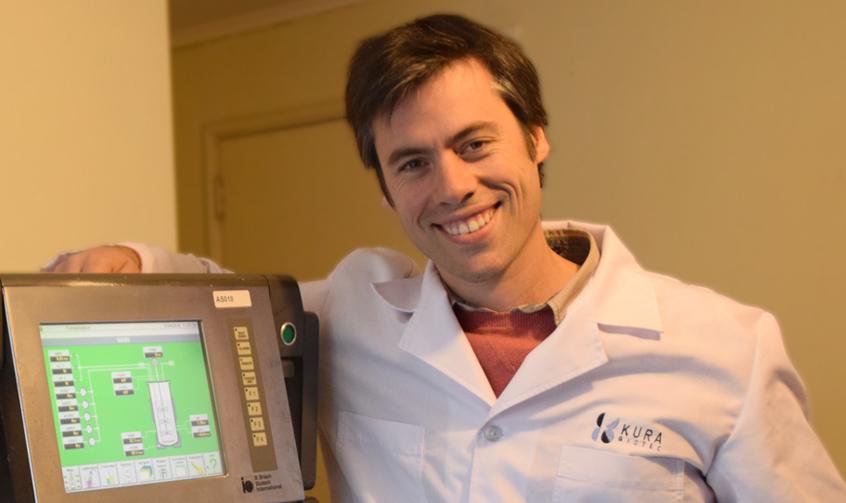"Why is the FBI interested in the guts of a mollusk that lives almost 9,000 kilometers from their branch offices in Washington, D.C. (USA)? The answer lies in the Chilean city of Puerto Varas, where amongst large populations of red abalone lives the biologist Manuel Rozas. From this mollusk, this young Chilean produces enzymes that are employed by the infamous American crime agency in their forensic toxicology screens.
Rozas es the founder of Kura Biotec, a start-up that has designed and optimized a process for reutilizing abalone byproducts in order to produce these efficiency record-breaking enzymes. This characteristic makes them the perfect candidate for the primary, American screening companies and the National Institute on Drug Abuse (NIDA), as well as the FBI, and lead to Rozas´ inclusion in MIT Technology Review, Spanish Edition´s list of Innovators Under 35 Chile 2016. In the words of the president of Grupo Suanfarma and a jury member for this competition, Héctor Ara, Rozas has become ""an internationally renowned authority on bioprocesses applied to marine animals"". This expert calls this an atypical case of ""the perfect combination between a scientist and businessman.""
Kura Biotec´s customers who already trust in the advantages of these enzymes use them to quantify the substances present in urine and blood, both in humans and animals, in order to perform anti-doping controls and drug screens. Normally both legal and illegal drugs form molecular aggregates within the organism upon metabolizing them. Rozas´ enzymes cut these aggregates open to identify the presence of molecules of illegal substances and quantify their presence.
Rozas recalls a test they performed in collaboration with NIDA to detect a type of synthetic drug known as bath salts in urine samples. They compared the use of Rozas´ BG100 enzyme with the substance used previously by the organization. Their results showed that, thanks to the use of Rozas´ enzymes, they required ""eight times less"" of the BG100 enzyme to perform the test. More efficient enzymes generate ""cleaner"" and more precise results, and are capable of detecting substances present within an organism in very small concentrations, the young biologist explains.
Kura Biotec has been working for the past two years on the development of a new enzyme for drug screens that, according to their projections, will exceed the best enzymes currently available on the market. ""It is between two and four times more effective"", states Rozas. For this work, Kura Biotec has employed a ""directed evolutionary"" approach with mutant enzymes based on a computational model. In collaboration with researchers from the University Andrés Bello (Chile), the team creates virtual models of several enzymes and causes them interact with the relevant molecules. The enzymes which demonstrate the highest levels of reactivity continue on to a subsequent phase of in vitro tests. This reduces the randomization of the selection process for the best candidates and accelerates the time to market.
It´s no wonder that the jury panel considers Rozas as ""a source of inspiration, an example of technological transfer"". A graduate from the Pontifical Catholic University of Chile, Rozas founded his first company in 2009, and, in the space of just six years, he has commercialized products in North America, Europe, Asia and Australia, achieving sales figures in excess of one million dollars. He got his start, as he recalls, in a laboratory he setup in his home, ""doing tests for more than a year before I achieved a quality product"". Today, there is no other laboratory like Rozas´, in the south of Chile and ""just a few kilometers from the source of the raw material"", Rozas says.
It was precisely this interest in leveraging the aquaculture industry´s byproducts in his region that lead him to embark upon this business venture. Chile is the fifth producer of abalone worldwide and was looking to revalue these byproducts and reduce the environmental impacts of this industry. Rozas forms part of a generation that wants to transform the production model of their countries and go one step further, towards a future in which technology will allow countries to compete equally with the main, global actors, from any corner of the globe. Even from a bucolic town of 40,000 residents at the base of the Patagonia."




